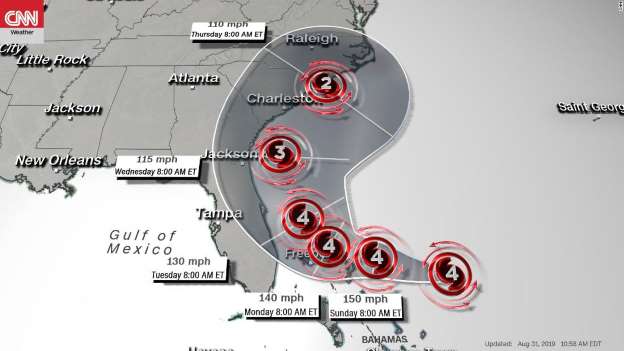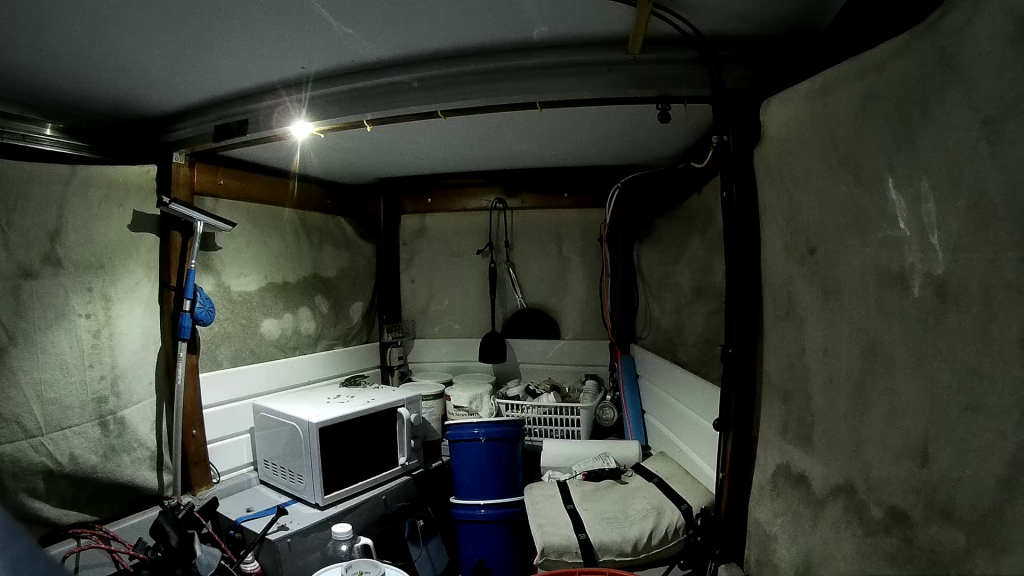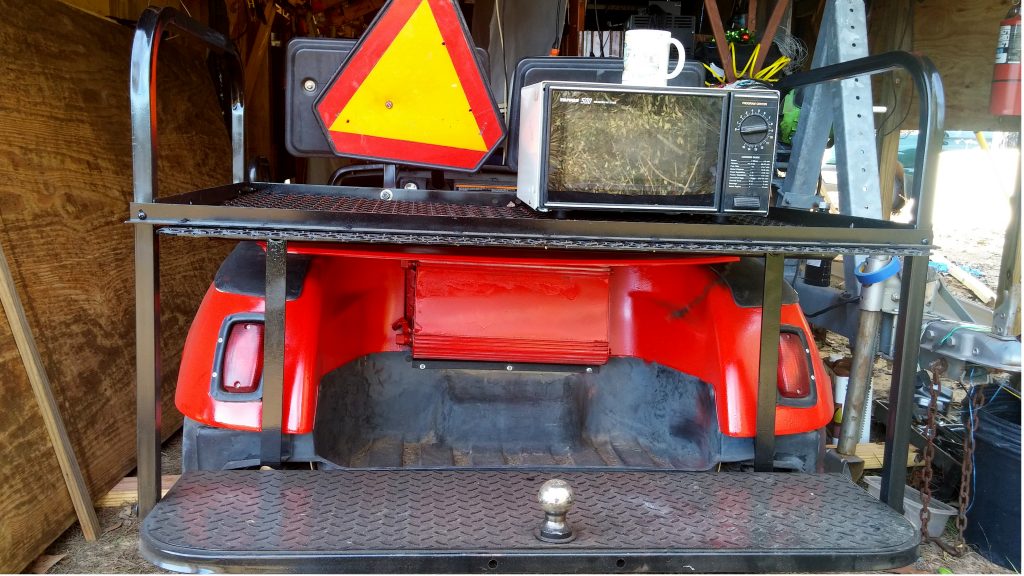
I was working on a new series of posts on the basics, but something has come up…a hurricane. The projected trajectory has it going over Puerto Rico, where they’ve still got a lot of PTSD from the last one, then pass by John’s balcony in Miami and maybe come ashore somewhere between West Palm and Jacksonville. I have a friend in St. Augustine who has had chest deep water in his living room twice in recent years, so the Jacksonville area folks should be getting anxious. Earlier on it was expected to cross to the Gulf and rake the panhandle, where many have the same attitude as the folks in PR. I am happy to say it is no longer headed straight for MY HOUSE…unless it changes again. In our area, we had them coming in one right after another and then they quit about 15 years ago. People have forgotten and trees have not been trimmed along power lines.
Suddenly, PR grocery stores were out of bottled water and I’d bet the easy foods were gone, too. Now it is that way all up the Florida coast and beginning in Georgia. I get my water from a spring via a water-powered pump, so I don’t worry too much about bottled water. I have a couple of 300 gallon tanks I may put on a trailer and fill up for the neighbors’ use if the utility goes down after a storm. A couple of 5 gallon buckets and a ceramic filter kit from ebay can set you up with a filtering system that will filter pretty much any water. I used one of these on my boat and it’ll turn any creek, pond or mudhole into fresh drinking water.

I always try to keep a well-stocked pantry at home. Even when there isn’t a storm that has popped up, a well-stocked pantry can save you trips to the store and give you a greater variety of meals you can prepare on a whim. I also have lots of ramen noodle cups—not for survival food, but because I like them.
If you find yourself in the predicament that a storm is coming, your cupboards are bare and the supermarket has been picked over there are still options. (Tip: Walmart and some sporting goods stores have camping and survival food) Do people clean out the shelves with cornmeal or flour or cooking oil? Nope. You can make up some biscuits, cornbread muffins and tortillas before the power goes off and it is pretty easy to make them even without power or with your solar backup that you probably have, considering you are reading a solar blog. Try something like 3 scoops flour, one scoop water, yeast if you have it, a tablespoon of salt, a tablespoon of oil (I like coconut oil) and a dash of honey. If you have some sesame seeds, sunflower seeds, pecans, or carrot bits you can pitch in, then it starts getting downright tasty and nutritious! Make doughballs and bake them at 350 for just under a half hour. The stuff will keep and keep you alive. If you find a jar of jelly or peanut butter then you are doing good. Tortillas can be flour and/or meal with enough water to make a dough. Roll them out with a rolling pin or a bottle and fry them in oil. Stuff them with leftovers or canned beans or smear them with peanut butter and jelly. You can also make waffles, pancakes and hushpuppies! Oh, heck, you have a cookbook, don’t you?
If you have backup power from battery, solar or generator and need to keep the consumption down, a toaster oven and and induction cooktop are cheap, low power cooking tools. You reckon WalMart is going to sell out of them when a hurricane warning is posted? I doubt it. There is a foldout oven made for a Coleman gas camp stove, but it can be made to work, too, with a rocket stove that burns twigs and bark and stuff. A $10 coffee maker will make hot water for noodle cups. And coffee. Once the sun comes out, which is usually pretty quick, John has solar cooking ovens that you might want to look at BEFORE the storm. That’s really the key. How well you do after the storm can depend a lot on what you do before the storm. Oh, and make sure you have a manual can opener, too. I always keep a few of the GI P38 openers.
What about your power system? If you have a generator, top up the fuel and check the oil. Get your spare fuel cans topped up while you can. In PR, they still have a lot of generators left over from Maria and the various agencies have them fueled. Water the batteries, if you have them.
I know MY system has some vulnerabilities. Assess yours and do the best you can. Check mounting bolts and clips and make sure the wires are snugged in tight. In my case, I don’t reckon the batteries are going to blow away, but the solar roof tiles are only rated at 60mph. I find that distressing, but the only thing I could do about it is drill holes and insert special clips in each one. Yeah, and there are over 350 of them. Not going to happen. There are a lot of big panels mounted on rails trailing down from the roof of the Solar Shed. These are easily removed. My plan is to store some of them in a valley under a truck or trailer. The rest will go in the very sturdy garage at a house I own in another town nearby. I have stacks of unused solar shingles that would fly individually and cause some havoc, but they could be duct taped into large bricks that won’t blow away. If all goes well, the shed will still be there and functional. If not, I’ll bring the panels home and assess what I need to do to get the lights back on. I have a big diesel generator, well lots of them, but have not needed any in years. It probably would not hurt to get one back in good order, especially when I already have 500 gallons of fuel for it. If it comes to it, your car can keep the lights on and fridge cool if you have a good 12v inverter. If you don’t, Sun Electronics has them or even kits for an entire power system. Top up the car’s gas tank, as it makes a dandy generator when combined with an inverter. Each of my golf car-based farm vehicles has a 3kw inverter and can serve a field kitchen, if need be.

Having a few good candles or oil lamps and some long nose lighters is a good idea. They have about quit making decent matches, so I recommend the gas lighters. A LOW power flashlight, spare batteries, a small LED lantern and even those solar walk lights can provide enough light to get around the house until you can get the mains or backup power running.
Know where the first aid kit is, too. Get some cash out of the bank.
Yes, I am yammering on about what I would do, but it is to give you ideas for your own particular situation. John and I were talking a while back about survival shelters and power systems. Just bringing some panels and a few components indoors to a very sturdy area could be all it takes to get the power back quickly after a storm. Vast areas of Mississippi, Arkansas, Georgia and other tornado alley areas have storm shelters outdoors or built into the house. Keep a few panels and accessories in there for safe keeping, even if you don’t normally use solar power.
If you do end up with a bad storm and your neighbors did not prepare well, it would not hurt to have some of that homemade hardtack to hand out. Some places have been more dangerous after the storm than during. Don’t tell them you have fresh food in the fridge and other niceties and don’t leave the lights burning brightly or generator wailing away. If things get really desperate, otherwise nice neighbors might turn really bad if starving. I know a guy who keeps a grinder and a bushel of hard corn to hand out to the neighbors and zombies. Another way to deal with unprepared neighbors would be to have a cookout and make stone soup or hobo stew. Start with a pot of water and then invite folks to toss in thawing meat, canned veggies, spices and so forth. This can turn into quite a feast and is sure to promote good will.
One last thing, from personal experience, if the lights go out, don’t worry with it until after the storm is over. Every time you hear of folks who ran a generator in the garage and the fumes got into the house and killed everybody in the house. You’ll want the generator, if you use one, outside. During one hurricane, I set my newly acquired Onan outside and set it to running as soon as the lights went out. Well, the winds picked up and a big limb came down and jammed the generator throttle wide open. It blew up every CF light bulb (which cost $19 each back in the day) in the house. I ran out long enough to shut it down, which was also dangerous. So, my zeal to keep the lights on resulted in the death of my generator and all of my lights AND I got thoroughly soaked when shutting it down. Nah, don’t worry about the lights until after the storm if your backup system doesn’t handle the job for you. That’s why you have those LED flashlights, candles and lanterns, right?
If you are in the storm path, make your preps and hunker down. I wish you well and we’ll get back together after it’s over. –Neal
